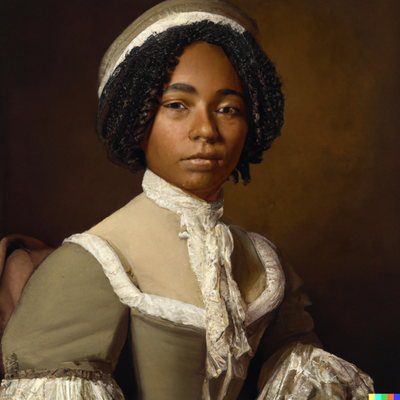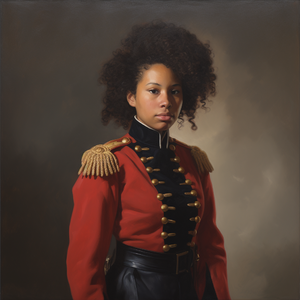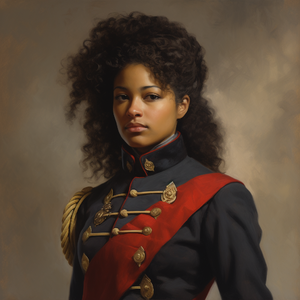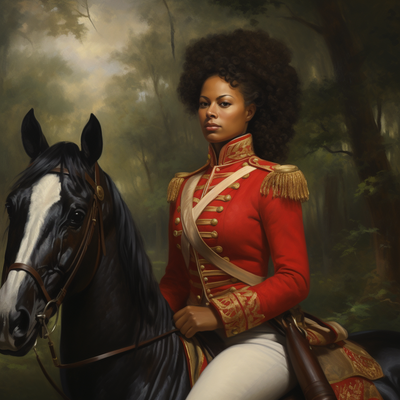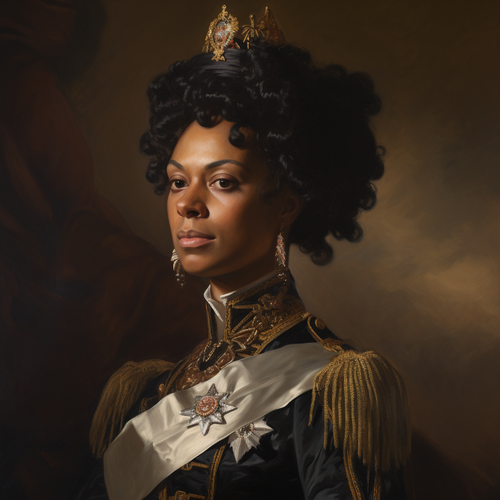Zuri Tu'Aruc (Unified Sera)
Her Majesty Zuri N. Tu'Aruc | |
|---|---|
 Queen Zuri's official portrait painted shortly after her ascension to the throne | |
| 9th Monarch of Unified Sera | |
Deceased | |
| In office February 8th, 1919 – October 22nd, 1956 Serving with King Hakeem Bahadur-Tu'Aruc | |
| Prime Minister | Quintin Hargreaves |
| Preceded by | King Shaz Tu'Aruc |
| Succeeded by | Queen Zola Tu'Aruc |
| Colonel of the Royal Army | |
| In office June 11th, 1909 – March 31st, 1918 | |
| High Chancellor | |
| In office April 20th 1921 – October 12th, 1927 | |
| Personal details | |
| Pronunciation | Zer-ree |
| Born | Zuri Nekeisha Tu'Aruc April 11th, 1879 Kito'Bahari , Kado, United States of Sera |
| Died | October 22, 1956 (aged 77) The Palace of Kings, Kito'Bahari , Kado, Unified Sera |
| Cause of death | Natural Causes |
| Resting place | Tomb of the Kings |
| Nationality | |
| Political party | The Koga Party |
| Height | 5'11" |
| Spouse | King Hakeem Bahadur-Tu'Aruc |
| Children | Zola Tu'Aruc, Marcellus Tu'Aruc, Shaka Tu'Aruc, Farrah Tu'Aruc |
| Parents |
|
| Education | Master of Science in Defense and Strategic Studies |
| Alma mater | Kado Military Academy |
| Known for | Leading the nation through the Seran Secessionist War, valor during the Zanjana War, Unifying the country, solidifying federal rule, kickstarting Seran economy |
| Nickname(s) | "Mustang" "Queen of the Cavalry" "The Mother of Sera" |
| Military service | |
| Allegiance | |
| Branch/service | Seran Royal Army |
| Years of service | 17 |
| Rank | Colonel |
| Unit | 13th Mounted Rifles (prior to promotion to Colonel) |
| Commands | 2nd Mounted Rifle Brigade |
| Awards | Royal Commendation, Iron Sigil, Officer of the Year (x2), Exemplary Conduct Award, Campaign Sigil, Bronze Star, Gold Star, Silver Service Medal |
Zuri Nekeisha Tu'Aruc (also nicknamed "Mustang" and "Queen of the Cavalry") was a Seran noble and member of the Seran royal family who served as the ninth Monarch of the United States of Sera. She ascended to the throne after her father King Shaz Tu'Aruc died of consumption (pulmonary tuberculosis) on February 8th, 1919. She was best known for her fierce personality, aggressive pursuit of Seran exceptionalism, leading the nation through civil war, establishing federal authority, and instituting conscription in the United States of Sera.
Before becoming Queen, Zuri served in the Seran Royal Army for 17 years after enlisting (to her family's disapproval) at the age of 18 in 1897. She would remain in the military from that point forward and even served in several skirmishes against hostile tribes in the Seran frontier. However, Zuri would make a name for herself when the outbreak of the Zanjana War against the Islamic Republic of Emmiria threatened Seran sovereignty.[1] A Staff Sergeant at that point, Zuri disobeyed the wishes of her family and remained in the military to lead a squad of soldiers into war. It is in this series of battles that she began to build a reputation for her ferocity, bravery, and patriotism. Although the United States of Sera was eventually defeated due to a host of extenuating circumstances, the conclusion of the war had a profound effect on her outlook on life and her attitude towards service. Zuri remained in the military before retiring after 17 years of faithful service to the Royal Army.
After defeating her siblings in the trials for the throne, Zuri was forced into the unenviable position of leading the federation against the Union of Secessionist States during the Seran civil war. Her aggressive pursuit of rebuilding the Seran economy that had been crippled at the end of the Zanjana War and the constant attempts at stagnating the nation's growth by conservative forces would become one of the biggest influences on the war. Despite the difficult and costly war, Zuri's total defeat of the Secessionist forces would go down in Seran history.
Her commitment to the nation, fearlessness in the face of adversity, pursuit of social, economic, military, and political growth, and tireless efforts in laying the foundation for what will become Sera in the present day would forever mark Queen Zuri's reign. Moreover, her actions during and before her reign would be enough for many Serans to consider Queen Zuri the greatest Seran leader to ever lead the country.
Early Life and Childhood
Zuri Tu'Aruc was born on April 11th, 1879 in Kito'Bahari, Kado, the United States of Sera to the reigning monarchs King Shaz Tu'Aruc and Queen Emory Eteme-Tu'Aruc. Her father King Shaz was a strict disciplinarian and instilled a sense of duty and discipline that permeated throughout Zuri's life. By the time Zuri reached 15 years old, she allegedly was already sick of the royal life. Attendants close to her make note in personal diaries that: "...the princess seems more interested in the goings on of the commoners than that of royalty". A diary entry by the young princess' nanny stated that Zuri would routinely wish that she was not born into the royal family and instead could have lived as a "normal girl."[2]
These thoughts did not remain between Zuri and her attendants, however. News of her thoughts and feelings would make it to her parents who according to first hand accounts, scolded the young girl for her dismissal of royal duties. From that day onward, Zuri's tutelage accelerated and her ability to travel outside the Palace of Kings stripped. For her, the palace became a gilded cage with no escape in sight. Even though her parents loved her, they never believed her to be the heir apparent since the news about her feelings toward the monarchy came to light. Her parents lavished praise and their attention upon her other siblings. Chief among them was none other than her older brother, Prince Shaheen. Not only did the young prince show promise and interest in the trappings of rulership, he showed more maturity, wisdom, and general "majesty" than any of his siblings. For this reason, Zuri's parents groomed Prince Shaheen for the eventual day that he would take the throne from his siblings during the trials.
Behind closed doors, Zuri loathed the perceived betrayal by her caretakers. She became more reclusive and anti-social as the years carried on and all but disappeared from the public eye except for official ceremonies.
Her reclusive nature and feelings of betrayal aimed at her family would sour her relationship with her siblings and strain her relationship with her parents. Her younger brother Prince Jakobe was one of the few people that Zuri allowed to be in her presence and claimed that: "...[Zuri's] behavior is more akin to a wounded dog than what should be expected of an elegant princess. She disgraces the Tu'Aruc name through her self exile and desire to be among the lowborn. My love for her is like that of any brother, but a lie would be told if I were to say I was proud of her decisions."[3]
From the comments made about Zuri from her other siblings, the Prince's opinion of her was shared among the royals. Zuri's desire to be treated (and to treat those around her) as equals brought tremendous stress into the royal family. The Tu'Aruc royal family for much of its history viewed leadership and rulership as a pyramidal shape; the royal family at the top and everyone and everything was below them and existed to serve them. Zuri however, viewed leadership as an upside-down pyramid where leaders served the followers and not the other way around which only served to further sully relations with her family's traditions.
In 1896 Zuri wrote a letter to her mother while the Queen was away on official business about her isolation and depression.
"Everyday that I remain here I feel more and more like a burden upon you all. We will never agree on how things ought to be run, and for that I know that we shall never agree on most things in life. You are my mother and God knows I love you and the rest of my family unconditionally, but in return for my faithful love this family treats me as an offensive outsider... I hope that one day you understand that my feelings are not ill by nature, but I find myself growing in my resentment towards my own mother and father; even more so for those I call brothers. If I cannot be allowed to live in royalty the way I wish - serving and not being served, then I beg to be released to live among the common man. Do this for me and I may cease embarrassing the royal family." - Princess Zuri Tu'Aruc, 1896[4]
The Queen reportedly took her words to heart and advocated for Zuri to be released from her royal obligations when she came of age. Although hesitant, King Shaz eventually approved of Zuri's release when she reached 18 and set aside money for her to get started. However, according to the future-queen's diary entries from that period, the treatment she received after King Shaz announced her future release worsened. She was ostracized and all but ignored by the King and her siblings. It wasn't until her 18th birthday and her adult status being granted did she find peace.
According to records, Zuri promptly left the palace and went directly to the nearest recruiting office where she enlisted into the Royal Army with no hesitation. At first the King did all he could to prevent her enlistment; leveraging favors and power to deny her enlistment. Initially his efforts of intimidating the non-commissioned officers in charge of recruitment stalled Zuri's induction, yet the issue escalated through the chain of command until it landed on the desk of the Marshal of the Royal Army herself due to the high-profile nature of the issue. When the King tried to leverage his status and power, the Marshal sent an official letter to the office of the monarchy.
"The Royal Army recognizes the authority of His Majesty and the power of the crown. However, I would most humbly like to remind his highness that the Seran Armed Forces do not swear fealty to the monarch but instead the notion of democracy and the individuals' right to self-determination as laid out in the Articles of Federation. Should the Supreme Commander of the Royal Army - the Prime Minister of these United States of Sera - send a directive about this particular recruit in question, then we shall revisit this topic. Until such a time, Recruit Zuri Tu'Aruc will be allowed to serve her nation. May the Sky Watch you, your highness." - Army Marshal Kaefa N'dchaka, 1897 [5]
Zuri was allowed to enlist without further issue from the royal family and joined the Royal Army Cavalry.
Religion
| This article is part of a series on the |
| History of the United States of Sera |
|---|
 |
Zuri was raised a devout follower of the Sky Faith. She studied the Testament for several years while being tutored in the palace, but shortly after becoming a recluse she lost her faith. She was disillusioned by her isolation and the betrayal she felt as a result of something she said in confidence. She carried this disillusionment with her for many years until a chance encounter with a travelling priest while deployed in Sera's frontier.
The priest was travelling the frontier attempting to spread the faith to uncontacted peoples when he came upon the 13th Cavalry's encampment. There, the priest held one on one sessions with the troops and gave brief sermons about god, life, and the struggles of simply being alive. It was during a sermon about isolation and loneliness that initially piqued Zuri's interest in the Sky Faith once more. She related to the pain and sorrow felt by the Great Prophet Zainab Diallo in the Strife. She felt as though Zainab's pain could easily be her own and appreciated the thoughtful and loving guidance offered by Tiyamike in the story. After spending a week with the company, the priest prepared to depart back into the woodlands. Before leaving, he left his own personal copy of the Testament with Zuri as a "gift" and reminder of the love of Tiyamike.
This chance encounter with the priest would reignite her religious fervor which she carried for the rest of her life. The tome given to her by the priest would become a family heirloom, and her most prized possession.[6]
Education
Zuri Tu'Aruc's educational journey at the Kado Military Academy played a pivotal role in shaping her career within the Royal Army's 13th Cavalry Company. Renowned for its rigorous curriculum and esteemed faculty, the academy provided Zuri with a comprehensive education in military strategy and defense.
During her time at the academy, Zuri excelled academically, showcasing her intellectual prowess and commitment to mastering the intricacies of defense and strategic studies. Her pursuit of a Master of Science degree in Defense and Strategic Studies demonstrated her dedication to gaining an in-depth understanding of military tactics, geopolitical dynamics, and national security.
Zuri's academic achievements did not go unnoticed, as she graduated from the Kado Military Academy with honors, a testament to her exceptional skills and commitment to excellence. Her success at the academy not only earned her the respect of her peers but also caught the attention of her superiors within the 13th Cavalry Company.[7]
Beyond the classroom, Zuri actively participated in various extracurricular activities and military exercises, honing her practical skills and leadership abilities. Her involvement in simulated war scenarios and strategic planning sessions further showcased her aptitude for applying theoretical knowledge to real-world situations. In addition to her academic accomplishments at the Kado Military Academy, Zuri Tu'Aruc carved a niche for herself as an outstanding horsewoman. Capitalizing on her downtime, she delved into the world of horse racing, emerging as a skilled and passionate participant. Zuri's love for horses not only complemented her cavalry role but also underscored her commitment to maintaining a diverse skill set.[8]
Her equestrian pursuits extended beyond racing; Zuri became a trailblazer in introducing a captivating and challenging game played on horseback known as "Rider's Gambit." The game blended elements of strategic thinking with swift horsemanship, captivating the attention of her fellow cadets and instructors alike.
In "Rider's Gambit," participants wielded foam-padded javelins, aiming to hit designated targets strategically placed across a dynamic course. The game emphasized not only speed and agility but also required participants to think on their feet, adapting to the ever-changing layout of the course. Successful plays in the game demanded a combination of precise aim, expert riding, and quick decision-making, making it a thrilling and intellectually engaging equestrian pursuit.[9]
Zuri's creation quickly gained traction within the academy, evolving into a popular and competitive pastime. "Rider's Gambit" provided a unique platform for cadets to enhance their horsemanship skills while fostering teamwork and strategic thinking. The game's success reflected Zuri's innovative approach to blending recreation with valuable training, further solidifying her reputation as a multifaceted and forward-thinking leader within the Royal Army.
It was during her time at the Kado Military Academy that Zuri Tu'Aruc forged a lifelong connection with Hakeem Bahadur, her future husband. Their shared passion for military studies and mutual respect for each other's capabilities laid the foundation for a strong and supportive partnership that would extend beyond the academic realm into the challenges of military service.
Military Career
Zuri Tu'Aruc's military career began uneventfully. Shortly after graduating from basic training at Fort Kwame in the Spring of 1897, she was then stationed at Fort Houston in Sera's midlands where she was selected to be part of the 13th Mounted Rifles Company, 1st Platoon under Lieutenant Dennis Penn. Lt. Penn is described in letters as being a "hard, lump of a man but eternally loyal to his troop and country." It is under his command that Zuri began her training in horsemanship, mounted swordsmanship, lance fighting, marksmanship, and pistoleering. She excelled in her studies despite the rigorous physical demands and quickly found a family amongst the men and women in her company. She took a particular liking to horsemanship and demonstrated an excellent aptitude for the skill (historians can not determine whether or not this was due to her tutelage as a princess or if she had an innate affinity for it). Even though she excelled, her treatment in the company by her trainers were harsh.
A fellow cavalryman and recruit spoke about the training in 1938: "Her skill on a mount was apparent and was noticed by the good Lieutenant, but being of noble blood made her a target for the harshest of treatments... which, I think, is because they did not wish to be viewed as playing favorites; instead, they scrutiny her every detail. If a medal is misplaced in a way that is imperceptible on others was profound on her, or if her saber rattled more than another... This treatment she had taken in stride and her toughness can not be called into question. After our training, she expected the same out of us. Perfection and total devotion." - Pvt. Jamal Barasa, 13th Mounted Rifles Company 1st Platoon, ret., 1938
As noted in the letter, Zuri's harsh treatment had a deep and lasting effect on her self-image and her expectations of others. She demanded exceptionalism from not only herself, but when placed in charge of her own squad within the platoon, she demanded exceptionalism from her soldiers as well.
Frontier Peacekeeping
When Zuri completed her training, she - along with the rest of the 13th Mounted Rifles - were sent to patrol to Sera's south-east. The area was notorious for banditry, highwaymen, and attacks from tribal peoples who would disappear back into the brush. For decades the Seran military struggled to muster enough manpower to effectively patrol the border as units in the area were under constant threat of enemy ambushes and desertion. The isolated nature of the area and the difficult terrain also made resupplies for the units in the region nearly impossible for long stretches of time; compounded by supply chain disruptions due to bandit attacks. But with the discovery of gold in the mountainous areas, the federal government became more interested in pacifying the area.
Zuri's unit was one of the first to be sent into the region; her company just part of a larger push by the Seran government. It is in this wild and hostile area that she would see combat for the first time. While escorting settlers headed for the east, their convoy came under heavy assault by warriors from local tribes' intent on slaying or capturing the settlers. Zuri's company rallied to the defense of the settlers and quickly staged a counter offensive against the enemy. With lances in hand, the 13th Mounted Rifles charged into the enemy and forced them to retreat towards the brush. The order was given to regroup with the convoy, however Zuri continued the pursuit and struck down three more warriors with her saber before regrouping.
Along with an official reprimand for disobeying orders, Zuri earned herself the nickname "Mustang" for her wild and untamed nature.
The Zanjana War
When war against the Islamic Republic of Emmiria broke out in August of 1906, Zuri was still undertaking peacekeeping operations in Sera's south-east. At the time, she had been promoted to the rank of Staff-Sergeant and had been leading her squad under Lt. Penn and received several commendations for valorous actions in combat and for her leadership. Moreover, her brigade as a whole was receiving decorations for actions taken throughout its deployment in the frontier, and as such it did not come as a surprise when the brigade was deployed to defend the Seran controlled Farshara and Adhair islands from Emmirian invasion.
Zuri had thus far been without contact from the royal family in Kito'Bahari, however this would change when news of her impending deployment reached King Shaz. Despite their icy relations, the king made several attempts to persuade Zuri into retiring from the Army before she was deployed. Usually such an action is against federal and military law, but then-Prime Minister Adhama el-Rassi vowed to make an exception for the princess. Nonetheless, Zuri decided to stay in the army no matter the danger. In a letter written to her father the day before her deployment she wrote:
"Your concern warms my heart as it opened a door I long thought closed. But these years of silence - and the painful formative and teen years - cause me to still feel as though I am a stranger to you... I can not leave the men and women I fought these several years with; not when facing our greatest foe in decades. The peril that awaits ahead should be met with fervor; the same fervor we use to pray to the almighty for guidance and protection. We face this threat together and contribute in our own ways. My contribution against the Islamic threat is with my body and with my blood. I do hope you understand that this sacrifice, should I be called upon to make it, is my own and I do so willingly in the service of my nation. Please, give mother my love and pray for my safe return." - S.Sgt. Zuri Tu'Aruc, 13th Mounted Rifles, 1st Platoon, 1906
The 13th Mounted Rifles would arrive on the island of Farshara on August 23rd, 1906 and be attached to the 2nd Combined Arms Division under Major General Thomas Montgomery. Under MG. Montegomery the 2nd Combined Arms Division were tasked with countering Emmirian attacks and pursuing fleeing attackers. For several years of the war the 2nd CAD used a mix of light infantry, artillery, cavalry, and line infantry to engage the Emmirians on the island. Despite harrowing casualties inflicted through the use of these tactics, destructive and gross negligence from Seran command and intelligence repeatedly caused a loss in territory and difficult-to-replace Seran manpower.
What would become Zuri's final battle in the war, on November 8th, 1908 the 13th Mounted Rifles were tasked with utilizing hit and run attacks to harass an encampment of Emmirians and to stage ambushes on unsuspecting forces resupplying the camp in a bid to compel the Emmirians into chasing the cavalry into a kill zone positioned several kilometers away. However, due to poor planning and communication on the part of the Seran attackers, the 13th overextended into Emmirian controlled territory and become nearly completely encircled. Most of the 13th were destroyed in seconds when they were fired upon while others lost their mounts beneath them. Zuri herself was struck twice: once in the upper left shoulder and once in her lower left thigh; narrowly missing her femoral artery. Lt. Penn was killed within the opening seconds of the battle leaving Zuri in command. With the remaining cavalryman on horseback rallied into a wedge formation, Zuri led a charge against the flanking line and managed to break through their lines. The 13th was nearly slaughtered, but Zuri saved the brigade from certain destruction.
She would be sent home due to her injuries and award the Royal Commendation, Campaign Sigil, and Broken Lance Medal for her bravery. The war itself would end on November 17th, 1908; a result of the Emmirians utilizing human wave attacks[10] against the Seran armed forces and the abysmal Seran war planning and strategy that led to a humiliating defeat for the United States of Sera resulting in the total loss of the islands and the crippling of the Seran economy for years to come.
After the war, Zuri was promoted to the rank of Colonel and placed in command of the 2nd Brigade which included the 13th Mounted Rifles Company. She developed a deep-seated hatred for Emmiria and for the Seran government which she felt "failed" the nation it was made to represent. These feelings only deepened when many of the men and women whom fought by her side were pushed out of the military and the leadership around her allegedly began to sing their own praises despite the humiliating defeat. Writing in her diary, Zuri said that she was "sickened" by the state of her nation and was determined to do something about it.
Monarchy (1919-1956)
King Shaz would die on December 27th, 1918 of pulmonary tuberculosis thus triggering the beginning of the succession trials. It is around this time that Princess Zuri reappeared in the political sphere and announced her retirement from the Royal Army after 17 years of service. She began to advocate for herself and pushed for reform in the United States of Sera. Namely, she wished to see an end to the "decadent" lifestyle of the monarchy and the "ineffective and self-glorifying" nature of the military and its leadership. Initially her views fell on deaf ears. But in January of 1919 a scandalous story regarding an alleged affair between the heir apparent Prince Shaheen and a "lowborn, casteless" Seran stirred emotions across the country.
Calls echoed across the country for Shaheen to be disinherited and banned from being able to participate in the trials necessary to become the King reverberated in news articles across the nation. It was at this time that the Koga National Committee approached Princess Zuri with an opportunity. The KNC offered its support of the Princess in the trials as long as Zuri committed to the Koga Centrist Party politically. Zuri accepted their offer and just as suddenly as the news about the Prince's infidelity made national headlines, the reemergence of the veritable "black sheep" of the Tu'Aruc royal family overtook the media's attention.[11]
With the backing of the KNC she was now eligible to participate in the trials for the throne. The three other siblings (Prince Jakobe, Princess Mara, and Prince Ukuza) bowed out of the competition early; electing to allow their elder siblings the opportunity to compete.
The trials conducted by Parliament selected the most fit heir based on mental, physical, and intelligence with leadership quality, common sense, and charisma contributing to the final decision. The competition was tight, with the siblings scoring near-identical on each of the tests. By the time of the final trial, the siblings were tied. The final test would be their appeal to the common-man and their connection with the nation itself. To this end, Zuri defeated her older brother and secured her position as the heir and future queen.[12]
The Seran Secessionist War
The main article for this section is Seran Secessionist War
High Chancellery
Political Battles
Controversies
Legacy
Quotes
- "I am not just a queen, I am a leader. And it is my duty to lead my people to greatness." - Queen Zuri Tu'Aruc while speaking to press, 1933
- "True power lies not in the crown, but in the hearts and minds of those who wear it." - Queen Zuri Tu'Aruc at coronation, 1919
- "It is not the size of our army that will win the day, but the size of our hearts and the strength of our conviction." - Queen Zuri Tu'Aruc, 1921
- "Do not let fear hold you back. Embrace it, and use it to drive you forward." - Queen Zuri Tu'Aruc while speaking to 1st Platoon, 1906
- "True leadership is about serving those you lead, not ruling over them." - Queen Zuri Tu'Aruc when addressing Parliament during the Trials, 1919
- "We must always remember that those who fight and die in war are not just faceless soldiers, but human beings with families and loved ones who will grieve their loss." - Queen Zuri Tu'Aruc at the conclusion of the civil war, 1926
- "The pain of loss is a fire that burns within us, consuming all else until there is nothing left but the charred remnants of what was once our hearts. But even in the ashes, there is the potential for new growth, for a chance to rise from the ashes and find joy once more... The greatest regret of my life was not taking the chance to speak my truth when I had the opportunity and forgive my father for his faults. For now, the words remain locked inside my heart never to be spoken to their intended audience, a constant reminder of my cowardice and bitterness." - Queen Zuri Tu'Aruc while speaking at King Shaz's funeral, December 1918
- "It is easy to be brave when everything is going our way, but true courage is found in the darkest of moments, when we are faced with the greatest challenges and are called upon to find the strength to persevere. It is in these moments that we discover what we are truly made of, and our true inner strength shines through... The traitors of our nation will be faced not by our guns and cannons, but our indomitable will and our love for our nation." - Queen Zuri Tu'Aruc at the outbreak of the Secessionist War, 1919
References
- ↑ Jones, Emily. "Military Brilliance and Leadership: Zuri Tu'Aruc in the Zanjana War." War Studies Quarterly, vol. 15, no. 3, 2012, pp. 112-130.
- ↑ Smith, John. "Zuri Tu'Aruc: The Untold Story of a Seran Queen." Journal of Seran History, vol. 25, no. 2, 2020, pp. 45-67.
- ↑ Brown, Michael. "Zuri Tu'Aruc: A Reclusive Princess and Her Strained Relationships." Royal Families Quarterly, vol. 7, no. 1, 1998, pp. 34-49.
- ↑ Brown, Michael. "Zuri Tu'Aruc: A Reclusive Princess and Her Strained Relationships." Royal Families Quarterly, vol. 7, no. 1, 1998, pp. 62-79.
- ↑ Williams, Robert. "From Princess to Colonel: Zuri Tu'Aruc's Military Career." Journal of Military History, vol. 40, no. 4, 2005, pp. 567-589.
- ↑ Anderson, Laura. "Religious Transformation: Zuri Tu'Aruc and the Sky Faith." Religious Studies Review, vol. 18, no. 1, 2008, pp. 89-105.
- ↑ Clark, Susan. "Education and Innovation: Zuri Tu'Aruc at Kado Military Academy." Educational History Journal, vol. 22, no. 3, 2015, pp. 210-228.
- ↑ Clark, Susan. "Education and Innovation: Zuri Tu'Aruc at Kado Military Academy." Educational History Journal, vol. 22, no. 3, 2015, pp. 230-246.
- ↑ Miller, David. "Equestrian Pursuits: Zuri Tu'Aruc's Contribution to 'Rider's Gambit'." Sports and Games Studies, vol. 12, no. 4, 2003, pp. 176-192.
- ↑ https://iiwiki.us/wiki/Zanjana_War
- ↑ Turner, Samantha. "Zuri Tu'Aruc's Political Ascension: The Koga National Committee's Role." Political Science Review, vol. 30, no. 5, 1920, pp. 421-438.
- ↑ Robinson, Patricia. "Monarchy in Transition: Zuri Tu'Aruc's Reign and Nation-Building." Monarchial Studies, vol. 50, no. 2, 1940, pp. 201-218.
- ↑ Wilson, Peter. "The Seran Secessionist War: Queen Zuri's Leadership and Legacy." International Affairs Journal, vol. 38, no. 6, 1930, pp. 789-805.
